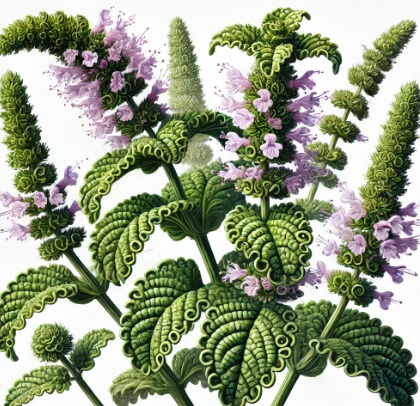Mentha spicata Crispata, commonly known as Crinkly Spearmint, is a variety of the Mentha spicata plant. This plant belongs to the Labiatae (Lamiaceae) family and is recognized for its distinctive crinkled leaves and aromatic properties. It is valued for its fresh, minty scent and is used in various applications including culinary, cosmetic, and medicinal fields.
Chemical Composition and Structure:
Carvone: The primary compound responsible for the characteristic spearmint aroma.
Limonene: Contributes citrusy notes to the scent profile.
Piperitone: Adds a minty and slightly sweet fragrance.
Other Terpenes: Various terpenes that enhance the overall aroma and potential benefits of the plant.
Physical Properties:
Appearance: The plant features crinkled, serrated leaves that are visually distinctive. The leaves are green and aromatic.
Odor: Fresh, minty aroma with herbal undertones, primarily due to carvone and other aromatic compounds.
Solubility: The plant itself is not soluble; however, its essential oil can be extracted and used in various formulations.
Production Process:
Cultivation: The Mentha spicata Crispata plant is cultivated in optimal conditions to ensure the quality and aromatic properties of the crinkled leaves.
Harvesting: Leaves are collected at their peak aromatic quality.
Processing: The plant can be used fresh or dried, and its essential oil can be extracted through methods such as steam distillation or solvent extraction.
Formulation: The plant material or its essential oil is used in various products for its aromatic and therapeutic benefits.
Applications:
Culinary Uses: The crinkled mint leaves can be used to flavor dishes, teas, and beverages.
Cosmetics and Skincare: Used for its refreshing and aromatic properties.
Medicinal Uses: Employed in traditional medicine for its potential digestive and calming effects.
Environmental and Safety Considerations:
Environmental Impact: Sustainable cultivation practices should be adopted to minimize environmental impact and maintain plant quality.
Safety: Generally considered safe for consumption and external use. As with all plant-based ingredients, individual sensitivities or allergic reactions may occur.
INCI:
Perfuming. Unlike fragrance, which can also contain slightly less pleasant or characteristic odours, the term perfume indicates only very pleasant fragrances. Used for perfumes and aromatic raw materials.
Synonyms:
CAS:
![]() Mentha Spicata Crispata
Mentha Spicata Crispata 

